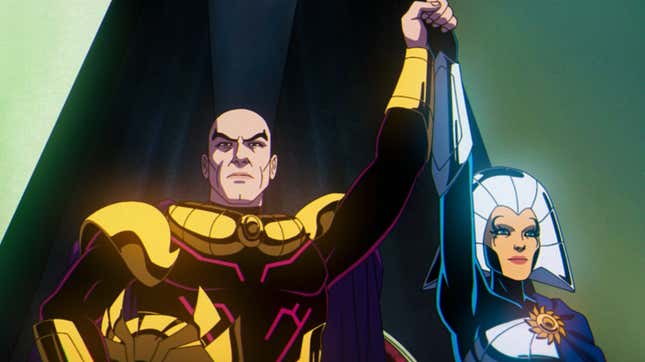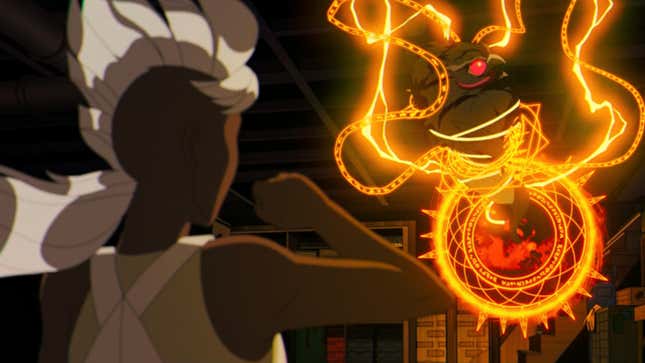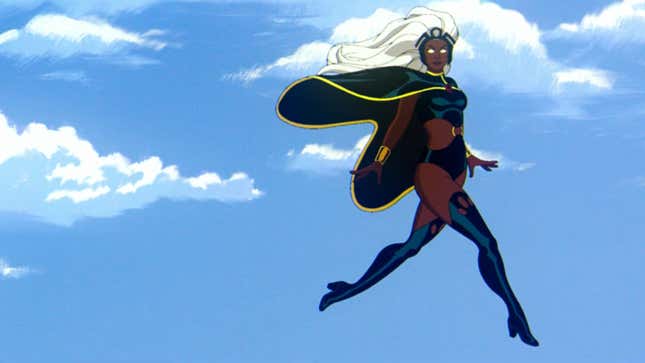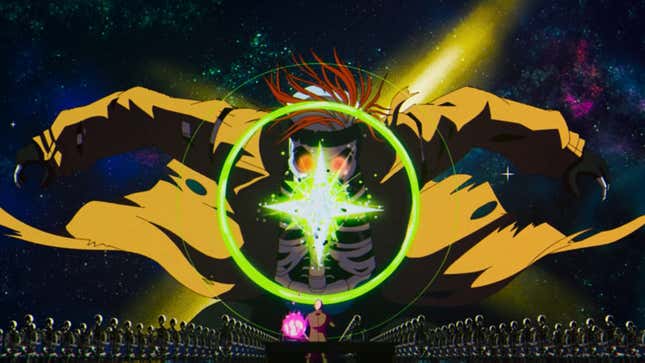After last week’s episode—already a contender for one of 2024’s best single episodes of TV—it would be tough for even a show as consistently strong as X-Men ‘97 to top what it just laid down. It’s not surprising then that this week’s episode of the Disney+ series doesn’t reach the same highs. It doesn’t quite stumble—but it does fall back on the show’s remaining issue of biting off way, way more than it can chew in a half hour.

Advertisement
“Lifedeath, Part 2” is named in such a manner that, unlike the original part—consigned to share title space and screen time with an unconnected story in episode four—you’d believe X-Men ‘97 was taking a break from the tragedy of Genosha to dedicate an episode to Storm’s navigation of her new, powerless normal. However, like much of what the show has accomplished so far, it is an episode caught bounding between two different stories, each filled with so many ideas and inspirations from the comics, that although they each ultimately share an emotional catharsis—and begin to set the wider stages for our disparate heroes to begin to come to terms with the Genoshan Genocide—having the two share just one episode slot robs X-Men ‘97 of really being able to sit with what it’s putting down on a weekly basis.
Advertisement

Advertisement
These two stories focus on firstly Storm, as the title suggests, as she continues to navigate the revelations of Forge’s background working with the U.S. government (and the arrival of sinister demonic entity the Adversary into the picture), but the second and arguably more distracting of the two thrusts us into the Marvel Cosmic to pick up with Charles Xavier for the first major time since ‘97 began. From the get-go, Charles’ side of the narrative throws a lot at the audience, both in terms of reference and also in having to pick up on the fraught astropolitics that come with exploring the Shi’ar empire—the avian aliens who promised to help heal Charles at the climax of X-Men: The Animated Series. Charles has also fallen deeply in love with their leader, Empress Lilandra Neramani. This is X-Men, of course, so it’s not just the very nature of Shi’ar Imperialism on the table, or its war with the Kree, or the various factions at play in Lilandra’s court (including her meddlesome sister Deathbird, vying for her throne), but also soap opera: just as important to all of these myriad issues Lilandra faces is her romance with Charles, which has led to her to make the shock announcement to her people that she intends to marry a human now that he is mostly healed from the wounds he sustained when Gyrich attacked him.
Naturally, such an announcement brings a sea of mess to the fore, and leaves Deathbird the chance to rile up people already uncertain of Lilandra’s strength as Empress to make her own power play away from the Kree front. She challenges Charles to prove his worth beyond his status as either mutant or human to undergo a test of fealty, needling him and Lilandra alike with the ultimate challenge: renounce his connection to Earth, surrender his memories of his homeworld and the X-Men, and she will cease challenging him taking Lilandra’s hand in marriage. Lilandra feels very differently about this than Charles does, of course—she loves him, and wants him to move on to having a life of his own beyond being the leader of the X-Men, a life she can share in, but to Charles, it’s tantamount to denying his personhood. For all the pain he has faced being a mutant (which even the Shi’ar still look down upon, despite the assimilationist practices of its Empire), for all the genuine love he has for Lilandra, asking him to deny this facet of his existence and how it’s shaped him as a person is a step that he cannot take.
Advertisement

It’s this similar idea that is mirrored in the actual “Lifedeath” part of “Lifedeath, Part 2,” as we pick back up with Storm at Forge’s ranch, and how her attempts to reconcile losing her mutant powers at the hands of the X-Cutioner have led to a horrifying encounter with the Adversary. In the comics, the Adversary, a key part of Forge’s own native backstory, was ultimately the instigator of what would be known as the X-Men’s “Outback Era”—a period of time where the X-Men chose to die to stop the Adversary, only to be resurrected in a world that still believed them dead, heading to operate in quasi-secrecy in the Australian outback. Here, the Adversary is a mirror to hold up to Ororo and ask herself if she can see who she truly is after undergoing such a traumatic loss.
Advertisement
If Charles’ side of this narrative asks him to bow to cosmic forces beyond him to explore what his mutant identity really means to him, Storm’s is of a supernatural sort, as she is not just threatened by the physical might of a foe that would be easily defeated with her powers, but threatened by having to confront her very fear of losing a vital aspect of her view of self. As Forge falls closer and closer to death after being bitten by the Adversary, Ororo doesn’t just have to navigate the idea of fighting the Adversary as a human, but her other fears beyond mutanthood—her uncertainty of her identity and her self-doubt, her claustrophobia, her inability to make space for her own wants and needs. It’s here that “Lifedeath, Part 2” becomes its messiest self, however, as it did navigating Madelyne Pryor’s long comics history in “Fire Made Flesh.” In the comics, the 1984 story X-Men ‘97 borrows its episode title from was the start of a long road for Storm, as she accepted the loss of her powers and still chose to navigate being a member of the X-Men without them, ending the story with a determination to believe in herself again, even if she never gets her powers back. She eventually does, but not before Storm’s journey takes her back to challenge Cyclops to leadership of the X-Men and winning, even without her abilities, among other things—a years-long arc for the character.

Advertisement
Instead, X-Men ‘97 resolves this struggle almost as soon as it began. The moment itself is cathartic, and plays well as a mirror to Charles’ own moment of realization about himself in that side of the episode. A claustrophobic Storm, trying to keep the Adversary at bay as she feels crushed by the walls of a tight cave structure containing the plants needed to heal Forge, defiantly reclaims herself and overcomes her fears, in turn overcoming whatever technology the X-Cutioner’s gun used to suppress her powers and re-transforming into a goddess of lightning. It’s a beautiful and intimate scene, a quasi-magical-girl changeover where instead of reclaiming her ‘90s white suit, Storm gives herself her iconic Giant Sized X-Men black-and-yellow gear, complete with the headdress, and regrows her hair away from the mohawk look that defined this journey in the comics for her, a radical change for a radical journey of self discovery.
But it’s also an awfully quick resolution that robs Storm’s catharsis of the impact it could’ve had. It’s not that it is different from how it plays out in the comics that is the issue—things change in adaptation all the time—but X-Men ‘97‘s repeated desire to throw as much narrative and ideas into each of its episodes condenses things that need time to breathe and to be further explored far more than they arguably should. It’s especially frustrating for “Lifedeath,” because its entire arc isn’t just crammed into a single episode, like “Fire Made Flesh” did with the life and times of Madelyne, barely allowing her to be her own character in the process. It had to not just share two episodes with largely disconnected stories to tell Storm’s story, but also have those halves then be sandwiched around the incredible, traumatic events of “Remember It”—an example of the show doing a lot with its time constraints and pulling it off astoundingly well—pulling us away to so many disparate story threads that Storm’s journey feels discordant and nowhere near as impactful as it should be. In the end, across three weeks of TV, we’ve spent maybe 15, 20 minutes with Storm wrestling with losing her powers, and no matter how wonderful the climactic moment is without that context, it loses something by not spending the time on a plotline that really deserved to sit with the audience.
Advertisement

Ironically, however, X-Men ‘97 still doesn’t have the time to sit with even this condensed moment of identity acceptance for either Ororo or Charles. As their threads wrap up they both come to learn of the horrors of what happened in Genosha, ending the episode as Charles adamantly vows to return home, no matter how much Lilandra begs him to stay, and with Storm robbed of her moment of catharsis in the face of overwhelming grief. And all that’s before we, the audience, are whisked away from even that to learn the true architect behind the Genoshan Genocide is none other than Mister Sinister (another change from the comics source material, but given that Deadpool & Wolverine is almost certainly going to be dealing with Cassandra Nova, it’s one that makes sense—and brings back another personal tie to X-Men ‘97‘s X-cast, with Morph, Jean, and Scott all having very strong reasons to go after Sinister anyway).
Advertisement
Time will tell just how all these pieces on the board begin to come together—but even though it did so in a rather messy fashion, X-Men ‘97 is setting the stage for all of its players to begin to reckon with the tragedy of Genosha… and from there, stand on a united mutant front in the face of extinction and do what the X-Men do best: survive the experience.
Want more io9 news? Check out when to expect the latest Marvel, Star Wars, and Star Trek releases, what’s next for the DC Universe on film and TV, and everything you need to know about the future of Doctor Who.
Services Marketplace – Listings, Bookings & Reviews